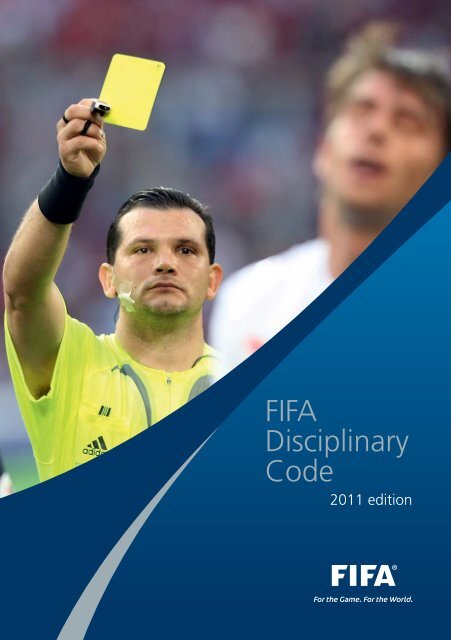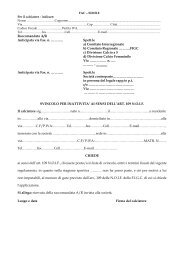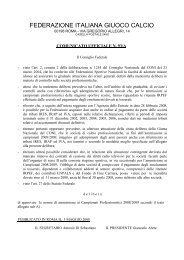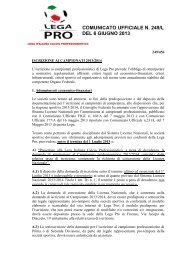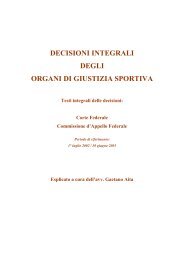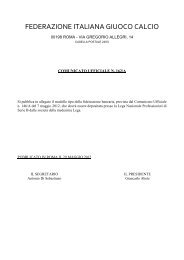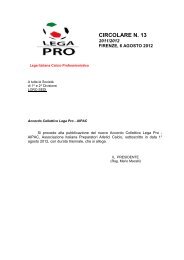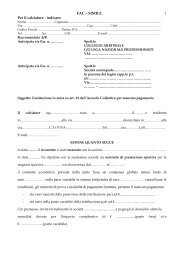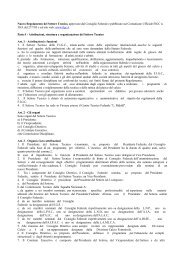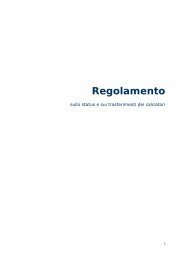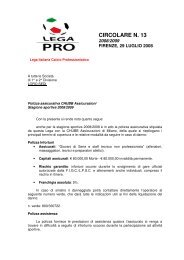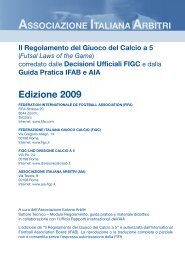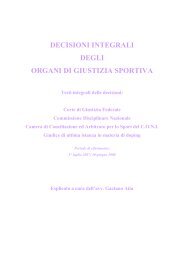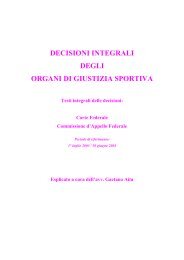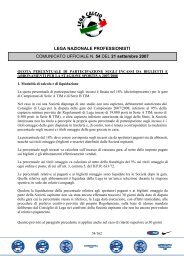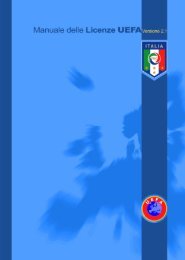Disciplinary Code.indd - FIFA.com
Disciplinary Code.indd - FIFA.com
Disciplinary Code.indd - FIFA.com
- No tags were found...
Create successful ePaper yourself
Turn your PDF publications into a flip-book with our unique Google optimized e-Paper software.
<strong>FIFA</strong><strong>Disciplinary</strong><strong>Code</strong>2011 edition
Fédération Internationale de Football AssociationPresident:Joseph S. BlatterSecretary General: Jérôme ValckeAddress:<strong>FIFA</strong><strong>FIFA</strong>-Strasse 20P.O. Box8044 ZurichSwitzerlandTelephone: +41-(0)43-222 7777Fax: +41-(0)43-222 7878Internet:www.<strong>FIFA</strong>.<strong>com</strong>
<strong>FIFA</strong><strong>Disciplinary</strong> <strong>Code</strong>2011 edition
2DISCIPLINARY COMMITTEEChairman:MATHIER Marcel, SwitzerlandDeputy chairmen: ESQUIVEL MELO Rafael, VenezuelaSAHU KHAN Muhammad S., FijiMembers:BURRELL Horace, JamaicaLAGRELL Lars-Åke, SwedenHAWIT BANEGAS Alfredo, HondurasNAPOUT Juan Ángel, ParaguayOMARI SELEMANI Constant, Congo DREDWARDS Mike, USAHACK Raymond, South AfricaHADDADJ Hamid, AlgeriaHADZI-RISTESKI Haralampie, FYR MacedoniaHONG Martin, Hong KongSEMEDO Mario, Cape Verde IslandsWALSER Reinhard, LiechtensteinGLADING Michael, New ZealandKENNEDY Raymond, Northern IrelandLUMPER Horst, AustriaPRITCHARD Phil, WalesHAYAT Makhdoom Syed Saleh, Pakistan
CONTENTS3PageArticlePRELIMINARY TITLE10 1 – Object10 2 – Scope of application: substantive law11 3 – Scope of application: natural and legal persons11 4 – Scope of application: time11 5 – Definitions12 6 – Gender and numberFIRST TITLE. SUBSTANTIVE LAWCHAPTER I. GENERAL PART13 Section 1. Conditions for sanctions13 7 – Culpability13 8 – Acts amounting to attempt13 9 – Involvement14 Section 2. <strong>Disciplinary</strong> measures14 10 – Sanctions <strong>com</strong>mon to natural and legal persons14 11 – Sanctions applicable to natural persons14 12 – Sanctions applicable to legal persons15 13 – Warning15 14 – Reprimand15 15 – Fine16 16 – Return of awards16 17 – Caution17 18 – Expulsion18 19 – Match suspension19 20 – Ban from dressing rooms and/or substitutes’ bench19 21 – Stadium ban19 22 – Ban on taking part in any football-related activity19 23 – Transfer ban19 24 – Playing a match without spectators20 25 – Playing a match on neutral ground20 26 – Ban on playing in a particular stadium20 27 – Annulment of the result of a match
4 CONTENTSPageArticle20 28 – Expulsion from a <strong>com</strong>petition20 29 – Relegation to a lower division21 30 – Deduction of points21 31 – Forfeit21 31bis – Replay of a match21 Section 3. Common rules21 32 – Combined sanctions22 33 – Partial suspension of implementation of sanctions23 34 – Time sanctions: calculation of time limit23 35 – Centralisation of sanctions24 Section 4. Carrying over and cancelling cautions and matchsuspensions24 36 – Carrying over cautions24 37 – Cancellation of cautions24 38 – Carrying over match suspensions26 Section 5. Determining the sanction26 39 – General rule26 40 – Repeated infringements27 41 – Concurrent infringements27 Section 6. Limitation period27 42 – Limitation period for prosecution28 43 – Commencement of the limitation period28 44 – Interruption28 45 – Limitation period for the enforcement of sanctionsCHAPTER II. SPECIAL PART29 Section 1. Infringements of the Laws of the Game29 46 – Minor infringements29 47 – Serious infringements30 Section 2. Disorderliness at matches and <strong>com</strong>petitions30 48 – Misconduct against opponents or persons other than match30 49 – Misconduct against match officials31 50 – Brawl
CONTENTS5PageArticle31 51 – Unidentified aggressors31 52 – Team misconduct32 53 – Inciting hatred and violence32 54 – Provoking the general public32 55 – Ineligibility33 56 – Unplayed match and abandonment33 Section 3. Offensive and discriminatory behaviour33 57 – Offensive behaviour and fair play33 58 – Discrimination34 Section 4. Infringements of personal freedom34 59 – Threats35 60 – Coercion35 Section 5. Forgery and falsification35 61 – [only]36 Section 6. Corruption36 62 – [only]37 Section 7. Doping37 63 – Definition37 Section 8. Failure to respect decisions37 64 – [only]39 Section 9. Responsibilities of clubs and associations39 65 – Organisation of matches39 66 – Failure to <strong>com</strong>ply40 67 – Liability for spectator conduct41 68 – Other obligations41 Section 10. Unlawfully influencing match results41 69 – [only]
6 CONTENTSPageArticleSECOND TITLE. ORGANISATION AND PROCEDURECHAPTER I. ORGANISATION42 Section 1. Jurisdiction of <strong>FIFA</strong>, associations, confederations and otherorganisations42 70 – General rule42 71 – Friendly matches between two representative teams43 Section 2. Authorities43 72 – Referee43 73 – Judicial bodies43 74 – Court of Arbitration for Sport (CAS)43 75 – <strong>FIFA</strong> Medical Committee44 Section 3. <strong>Disciplinary</strong> Committee44 76 – General jurisdiction44 77 – Specific jurisdiction44 78 – Jurisdiction of the chairman ruling alone45 Section 4. Appeal Committee45 79 – Jurisdiction45 80 – Jurisdiction of the chairman ruling alone46 Section 5. Common rules for the judicial bodies46 81 – Composition46 82 – Meetings47 83 – Chairman47 84 – Secretariat48 85 – Independence48 86 – In<strong>com</strong>patibility of office48 87 – Withdrawal49 88 – Confidentiality49 89 – Exemption from liability
CONTENTS7PageArticleCHAPTER II. PROCEDURE50 Section 1. General rules50 Subsection 1. Time limits50 90 – Calculation50 91 – Compliance51 92 – Suspension51 93 – Extension52 Subsection 2. Right to be heard52 94 – Contents52 95 – Restrictions53 Subsection 3. Proof53 96 – Various types of proof53 97 – Evaluation of proof53 98 – Match officials’ reports54 99 – Burden of proof54 Subsection 4. Representation and assistance54 100 – [only]55 Subsection 5. Language used in proceedings55 101 – [only]55 Subsection 6. Notification of decisions55 102 – Addressees56 103 – Form56 Subsection 7. Miscellaneous56 104 – Obvious errors56 105 – Costs and expenses57 106 – Enforcement of decisions57 107 – Baseless proceedings58 Section 2. <strong>Disciplinary</strong> Committee58 Subsection 1. Commencement of proceedings and investigation58 108 – Commencement of proceedings58 109 – Investigation58 110 – Collaboration by the parties59 Subsection 2. Oral statements, deliberations, decision59 111 – Oral statements, principles
8 CONTENTSPageArticle59 112 – Oral statements, procedure60 113 – Deliberations60 114 – Passing the decision61 115 – Form and contents of the decision61 116 – Decisions without grounds62 Subsection 3. Proceedings before the chairman of the <strong>Disciplinary</strong>Committee acting alone62 117 – [only]62 Section 3. Appeal Committee62 118 – Contestable decisions62 119 – Eligibility to appeal63 120 – Time limit for appeal63 121 – Grounds for appeal64 122 – Petition of appeal64 123 – Deposit65 124 – Effects of appeal65 125 – Sequence in proceedings leading up to the decision65 126 – Continuation of the proceedings66 127 – Proceedings before the chairman of the Appeal Committeeacting alone66 Section 4. Court of Arbitration for Sport (CAS)66 128 – [only]66 Section 5. Special procedures66 Subsection 1. Provisional measures66 129 – General rule67 130 – Procedure67 131 – Decision67 132 – Duration67 133 – Appeal68 134 – Approval of appeal68 Subsection 2. Deliberations and decision-taking without meeting68 135 – [only]68 Subsection 3. Extending sanctions to have worldwide effect68 136 – Request
CONTENTS9PageArticle69 137 – Conditions70 138 – Procedure70 139 – Decision70 140 – Effect71 141 – Appeal71 Subsection 4. Review71 142 – [only]FINAL TITLE72 143 – Official languages72 144 – Scope of the code, omissions, custom, doctrine andjurisprudence72 145 – Specific disciplinary rules73 146 – Associations’ disciplinary codes74 147 – Adoption and enforcement
10 PRELIMINARY TITLE<strong>FIFA</strong> <strong>Disciplinary</strong> <strong>Code</strong> (FDC)30 May 2011With specific reference to art. 59 par. 4 of the <strong>FIFA</strong> Statutes, the ExecutiveCommittee of the Fédération Internationale de Football Association (<strong>FIFA</strong>)enforces the following code.1 ObjectThis code describes infringements of the rules in <strong>FIFA</strong> regulations, determinesthe sanctions incurred, regulates the organisation and function of the bodiesresponsible for taking decisions and the procedures to be followed beforethese bodies.2 Scope of application: substantive lawThis code applies to every match and <strong>com</strong>petition organised by <strong>FIFA</strong>. Beyondthis scope, it also applies if a match official is harmed and, more generally, ifthe statutory objectives of <strong>FIFA</strong> are breached, especially with regard to forgery,corruption and doping. It also applies to any breach of <strong>FIFA</strong> regulations thatdoes not fall under the jurisdiction of any other body.
PRELIMINARY TITLE113 Scope of application: natural and legal personsThe following are subject to this code:a) associations;b) members of associations, in particular the clubs;c) officials;d) players;e) match officials;f) licensed match and players’ agents;g) anyone with an authorisation from <strong>FIFA</strong>, in particular with regard to amatch, <strong>com</strong>petition or other event organised by <strong>FIFA</strong>;h) spectators.4 Scope of application: timeThis code applies to facts that have arisen after it has <strong>com</strong>e into force. It alsoapplies to previous facts if it is equally favourable or more favourable forthe perpetrator of the facts and if the judicial bodies of <strong>FIFA</strong> are deciding onthese facts after the code has <strong>com</strong>e into force. By contrast, rules governingprocedure apply immediately upon the <strong>com</strong>ing into force of this code5 Definitions1. Post-match: the time between the final whistle from the referee and theteams’ departure from the confines of the stadium.2. Pre-match: the time between the teams’ arrival in the confines of thestadium and the whistle for kickoff from the referee.
12 PRELIMINARY TITLE3. International match: a match between two teams belonging to differentassociations (two clubs, one club and one representative team or tworepresentative teams).4. Friendly match: a match organised by a football organisation, club or otherperson between teams chosen for the occasion and possibly belonging todifferent spheres of operation; the score has an effect only on the match ortournament in question and, in the case of representative teams, on the <strong>FIFA</strong>rankings.5. Official match: a match organised under the auspices of a footballorganisation for all of the teams or clubs in its sphere of operation; the scorehas an effect on the rights of participation in other <strong>com</strong>petitions unless theregulations in question stipulate otherwise.6. Officials: anyone, with the exception of players, performing an activityconnected with football at an association or club, regardless of his title, thetype of activity (administrative, sporting or any other) and the duration ofthe activity; in particular, managers, coaches and support staff are officials.7. Match official: the referee, assistant referees, fourth official, match<strong>com</strong>missioner, referee inspector, the person in charge of safety, and anyother persons appointed by <strong>FIFA</strong> to assume responsibility in connection witha match.8. <strong>FIFA</strong> regulations: the statutes, regulations, directives and circulars of<strong>FIFA</strong> as well as the Laws of the Game issued by the International FootballAssociation Board.6 Gender and numberTerms referring to natural persons are applicable to both genders. Any term inthe singular applies to the plural and vice-versa.
FIRST TITLE. SUBSTANTIVE LAWCHAPTER I. GENERAL PART13Section 1. Conditions for sanctions7 Culpability1. Unless otherwise specified, infringements are punishable regardless ofwhether they have been <strong>com</strong>mitted deliberately or negligently.2. Exceptionally, a match may have to be played without spectators or onneutral territory, or a certain stadium may be banned purely for safety reasons,without an infringement having been <strong>com</strong>mitted.8 Acts amounting to attempt1. Acts amounting to attempt are also punishable.2. In the case of acts amounting to attempt, the body may reduce the sanctionenvisaged for the actual infringement accordingly. It will determine the extentof the mitigation as it sees fit; it shall not go below the general lower limit ofthe fine (cf. art. 15 par. 2).9 Involvement1. Anyone who intentionally takes part in <strong>com</strong>mitting an infringement, eitheras instigator or ac<strong>com</strong>plice, is also punishable.2. The body will take account of the degree of guilt of the party involved andmay reduce the sanction accordingly. It shall not go below the general lowerlimit of the fine (art. 15 par. 2).
14 FIRST TITLE. SUBSTANTIVE LAW CHAPTER I. GENERAL PARTSection 2. <strong>Disciplinary</strong> measures10 Sanctions <strong>com</strong>mon to natural and legal personsBoth natural and legal persons are punishable by the following sanctions:a) warning;b) reprimand;c) fine;d) return of awards.11 Sanctions applicable to natural personsThe following sanctions are applicable only to natural persons:a) caution;b) expulsion;c) match suspension;d) ban from dressing rooms and/or substitutes’ bench;e) ban from entering a stadium;f) ban on taking part in any football-related activity.12 Sanctions applicable to legal personsThe following sanctions are applicable only to legal persons:a) transfer ban;b) playing a match without spectators;c) playing a match on neutral territory;d) ban on playing in a particular stadium;e) annulment of the result of a match;f) expulsion;
FIRST TITLE. SUBSTANTIVE LAWCHAPTER I. GENERAL PART15g) forfeit;h) deduction of points;i) relegation to a lower division.13 WarningA warning is a reminder of the substance of a disciplinary rule allied with thethreat of a sanction in the event of a further infringement.14 ReprimandA reprimand is an official written pronouncement of disapproval sent to theperpetrator of an infringement.15 Fine1. A fine is issued in Swiss francs (CHF) or US dollars (USD). It shall be paid inthe same currency.2. The fine shall not be less than CHF 300, or in the case of a <strong>com</strong>petitionsubject to an age limit not less than CHF 200, and not more thanCHF 1,000,000.3. The body that imposes the fine decides the terms and time limits forpayment.4. Associations are jointly liable for fines imposed on representative teamplayers and officials. The same applies to clubs in respect of their players andofficials. The fact that a natural person has left a club or association does notcancel out joint liability.
16 FIRST TITLE. SUBSTANTIVE LAW CHAPTER I. GENERAL PART16 Return of awardsThe person required to return an award shall return the benefits received, inparticular sums of money and symbolic objects (medal, trophy etc.).17 Caution1. A caution (yellow card) is a warning from the referee to a player during amatch to sanction unsporting behaviour of a less serious nature (cf. Law 12 ofthe Laws of the Game).2. Two cautions received during the same match incur an expulsion (indirectred card) and, consequently, automatic suspension from the next match (cf. art.18 par. 4). The two cautions that incurred the red card are rescinded.3. If a player receives a caution in two separate matches of the same <strong>FIFA</strong><strong>com</strong>petition, he is automatically suspended from the next match in that<strong>com</strong>petition. The <strong>Disciplinary</strong> Committee may exceptionally depart from oramend this rule before the start of a particular <strong>com</strong>petition. Any such decisionreached by the <strong>Disciplinary</strong> Committee is final.4. If an abandoned match is to be replayed, any caution issued during thatmatch shall be annulled. If the match is not to be replayed, the cautionsreceived by the team responsible for causing the match to be abandoned areupheld; if both teams are responsible, all of the cautions are upheld.5. Cautions issued in a match that is subsequently forfeited shall not beannulled.
FIRST TITLE. SUBSTANTIVE LAWCHAPTER I. GENERAL PART176. If a player is guilty of serious unsporting behaviour as defined in Law 12 ofthe Laws of the Game and is sent off (direct red card), any other caution he haspreviously received in the same match is upheld.18 Expulsion1. An expulsion is the order given by the referee to someone to leave the fieldof play and its surroundings, including the substitutes’ bench, during a match.The person who has been sent off may be allowed into the stands unless he isserving a stadium ban.2. Expulsion takes the form of a red card for players. The red card is regardedas direct if it sanctions serious unsporting behaviour as defined by Law 12of the Laws of the Game; it is regarded as indirect if it is the result of anaccumulation of two yellow cards.3. An official who has been sent off may give instructions to the personreplacing him on the substitutes’ bench. He shall, however, ensure that he doesnot disturb the spectators or disrupt the flow of play.4. An expulsion automatically incurs suspension from the subsequent match,even if imposed in a match that is later abandoned, annulled and/or forfeited.The <strong>Disciplinary</strong> Committee may extend the duration of the suspension.
18 FIRST TITLE. SUBSTANTIVE LAW CHAPTER I. GENERAL PART19 Match suspension1. A suspension from a match is a ban on taking part in a future match or<strong>com</strong>petition and on attending it in the area immediately surrounding the fieldof play.2. An official who is suspended in application of par. 1 is automatically bannedfrom the dressing rooms in accordance with art. 20.3. The suspension is imposed in terms of matches, days or months. Unlessotherwise specified, it may not exceed twenty-four matches or twenty-fourmonths.4. If the suspension is to be served in terms of matches, only those matchesactually played count towards execution of the suspension. If a matchis abandoned, cancelled or forfeited (except for a violation of art. 55), asuspension is only considered to have been served if the team to which thesuspended player belongs is not responsible for the facts that led to theabandonment, cancellation or forfeit of the match.5. A match suspension is regarded as no longer pending if a match isretroactively forfeited because a player took part in a match despite beingineligible (art. 55). This also applies to the match suspension imposed on theplayer who took part in the match despite being ineligible.6. If a suspension is <strong>com</strong>bined with a fine, the suspension may be prolongeduntil the fine has been paid in full.
FIRST TITLE. SUBSTANTIVE LAWCHAPTER I. GENERAL PART1920 Ban from dressing rooms and/or substitutes’ benchA ban from dressing rooms and/or substitutes’ benches deprives someoneof the right to enter a team’s dressing rooms and/or the area immediatelysurrounding the field of play, and in particular to sit on the substitutes’ bench.21 Stadium banA stadium ban prohibits someone from entering the confines of one or severalstadiums.22 Ban on taking part in any football-related activityA person may be banned from taking part in any kind of football-relatedactivity (administrative, sports or any other).23 Transfer banA transfer ban prevents a club from registering any player during the period inquestion.24 Playing a match without spectatorsThe obligation to play a match behind closed doors requires an association or aclub to have a certain match played without spectators.
20 FIRST TITLE. SUBSTANTIVE LAW CHAPTER I. GENERAL PART25 Playing a match on neutral groundThe obligation to play a match on neutral ground requires an association or aclub to have a certain match played in another country on in a different regionof the same country.26 Ban on playing in a particular stadiumA ban on playing in a certain stadium deprives an association or a club of theright to have its team play in a certain stadium.27 Annulment of the result of a matchThe result of a match is annulled if the result reached on the field of play isdisregarded.28 Expulsion from a <strong>com</strong>petitionExpulsion is the deprivation of the right of an association or a club to take partin the current and/or a future <strong>com</strong>petition.29 Relegation to a lower divisionA club may be relegated to a lower division.
FIRST TITLE. SUBSTANTIVE LAWCHAPTER I. GENERAL PART2130 Deduction of pointsA club may have points deducted from those already attained in the current ora future championship.31 Forfeit1. A team sanctioned with a forfeit is considered to have lost the match by 3-0.2. If the goal difference at the end of the match is greater than three, the resulton the pitch is upheld.31bis Replay of a matchA match may be replayed if it could not take place or could not be played infull for reasons other than force majeure, but due to the behaviour of a teamor behaviour for which an association or a club is liable.Section 3. Common rules32 Combined sanctionsUnless otherwise specified, the sanctions provided for in Chapter I (GeneralPart) and Chapter II (Special Part) of this code may be <strong>com</strong>bined.
22 FIRST TITLE. SUBSTANTIVE LAW CHAPTER I. GENERAL PART33 Partial suspension of implementation of sanctions1. The body that pronounces a match suspension (cf. art. 19), a ban on accessto dressing rooms and/or the substitutes’ bench (cf. art. 20), a ban on takingpart in any football-related activity (cf. art. 22), the obligation to play a matchwithout spectators (cf. art. 24), the obligation to play a match on neutralground (cf. art. 25) or a ban on playing in a certain stadium (cf. art. 26) mayexamine whether it is possible to suspend the implementation of the sanctionpartially.2. Partial suspension is permissible only if the duration of the sanction does notexceed six matches or six months and if the relevant circumstances allow it, inparticular the previous record of the person sanctioned.3. The body decides which part of the sanction may be suspended. In any case,half of the sanction is definite.4. By suspending implementation of the sanction, the body subjects the personsanctioned to a probationary period of anything from six months to two years.5. If the person benefiting from a suspended sanction <strong>com</strong>mits anotherinfringement during the probationary period, the suspension is automaticallyrevoked and the sanction applied; it is added to the sanction pronounced forthe new infringement.6. Special provisions may apply in certain circumstances. In the case of antidopingrule violations, this article is not applicable.
FIRST TITLE. SUBSTANTIVE LAWCHAPTER I. GENERAL PART2334 Time sanctions: calculation of time limitThe duration of a time sanction can be interrupted by rest periods during orbetween seasons.35 Centralisation of sanctions1. Records of cautions, expulsions and match suspensions are stored in thecentral <strong>com</strong>puter system of <strong>FIFA</strong>. The <strong>Disciplinary</strong> Committee secretary confirmsthem in writing to the association or club concerned or, in the case of final<strong>com</strong>petitions, to the head of the delegation concerned.2. This <strong>com</strong>munication serves only as confirmation: sanctions (cautions,expulsions, automatic match suspensions) have an immediate effect onsubsequent matches even if the letter of confirmation reaches the association,club or head of delegation concerned later.3. To ensure that the relevant records are <strong>com</strong>plete, the confederations shallinform <strong>FIFA</strong> of all sanctions that have been pronounced during their own<strong>com</strong>petitions and are likely to be carried over to a <strong>FIFA</strong> <strong>com</strong>petition (cf. art. 38par. 2) or future <strong>com</strong>petitions organised by the confederations.
24 FIRST TITLE. SUBSTANTIVE LAW CHAPTER I. GENERAL PARTSection 4. Carrying over and cancelling cautions and match suspensions36 Carrying over cautions1. Cautions received during one <strong>com</strong>petition are not carried over to another<strong>com</strong>petition.2. They are, however, carried over from one round to the next in the same<strong>com</strong>petition. The <strong>Disciplinary</strong> Committee may exceptionally depart from thisrule before the start of a particular <strong>com</strong>petition. This provision is subject toart. 37.37 Cancellation of cautions1. Upon its own initiative or at the request of a confederation, the <strong>Disciplinary</strong>Committee may cancel cautions that have not resulted in an expulsion soas to restore the balance among several teams that have not played thesame number of matches during the first round of a <strong>com</strong>petition, or in otherexceptional circumstances.2. In any case, the <strong>com</strong>mittee may do this only once in any <strong>com</strong>petition.3. The <strong>Disciplinary</strong> Committee’s decision is final.38 Carrying over match suspensions1. As a general rule, every match suspension (of players and other persons) iscarried over from one round to the next in the same <strong>com</strong>petition.2. Match suspensions in relation to an expulsion pronounced on a playeroutside of a <strong>com</strong>petition (separate match[es]) or not served during the
FIRST TITLE. SUBSTANTIVE LAWCHAPTER I. GENERAL PART25<strong>com</strong>petition for which they were intended (elimination or the last match in the<strong>com</strong>petition) are carried over as follows:a) <strong>FIFA</strong> World Cup: carried over to the representative team’s subsequentofficial match;b) <strong>com</strong>petitions subject to an age limit: carried over to the representativeteam’s next official match in the same age group. Where the suspensioncannot be served in the same age group, it shall be carried over to the nexthighest age category;c) <strong>FIFA</strong> Confederations Cup: carried over to the representative team’s nextofficial match;d) <strong>FIFA</strong> Club World Cup: carried over to the club’s next official match;e) confederation <strong>com</strong>petitions for representative teams: carried over tothe representative team’s next official match in a <strong>com</strong>petition organised by<strong>FIFA</strong>;f) <strong>com</strong>petitions in which teams have been chosen in accordance withcertain criteria (cultural, geographical, historical etc.): if the regulations ofthese <strong>com</strong>petitions refer to the <strong>FIFA</strong> regulations for disciplinary sanctions,the suspension is carried over to the representative team’s next officialmatch;g) friendly matches: carried over to the representative team’s next friendlymatch.3. If a representative team is hosting a final <strong>com</strong>petition and is consequentlynot required to participate in qualifying matches to reach the final <strong>com</strong>petitionof this tournament and its next official match is in that final <strong>com</strong>petition, anymatch suspension pronounced in accordance with par. 2 of this article shall becarried over to the representative team’s next friendly match.4. In no case may match suspensions resulting from several cautions issued to aplayer in different matches of the same <strong>com</strong>petition be carried over to another<strong>com</strong>petition.5. Par. 2 likewise applies to suspensions pronounced against persons other thanplayers.
26 FIRST TITLE. SUBSTANTIVE LAW CHAPTER I. GENERAL PARTSection 5. Determining the sanction39 General rule1. The body pronouncing the sanction decides the scope and duration of it.2. Sanctions may be limited to a geographical area or to one or more specificcategories of match or <strong>com</strong>petition.3. Unless otherwise specified, the duration of a sanction is always defined.4. The body shall take account of all relevant factors in the case and the degreeof the offender’s guilt when imposing the sanction.40 Repeated infringements1. Unless otherwise specified, the body may increase the sanction to bepronounced as deemed appropriate if an infringement has been repeated.2. These provisions are subject to the special rules governing repeated antidopingrule violations.
FIRST TITLE. SUBSTANTIVE LAWCHAPTER I. GENERAL PART2741 Concurrent infringements1. If several fines are pronounced against someone as a result of one or moreinfringements, the relevant body bases the fine on the most serious offence<strong>com</strong>mitted and, depending on the circumstances, may increase the sanction byup to fifty per cent of the maximum sanction specified for that offence.2. The same applies if a person incurs several time sanctions of a similar type(two or more match suspensions, two or more stadium bans etc.) as the resultof one or several infringements.3. The body that determines the fine in accordance with par. 1 is not obliged toadhere to the general upper limit of the fine (cf. art. 15 par. 2).Section 6. Limitation period42 Limitation period for prosecution1. Infringements <strong>com</strong>mitted during a match may no longer be prosecutedafter a lapse of two years. As a general rule, other infringements may not beprosecuted after a lapse of ten years.2. Anti-doping rule violations may not be prosecuted after eight years haveelapsed.3. Prosecution for corruption (cf. art. 62) is not subject to a limitation period.
28 FIRST TITLE. SUBSTANTIVE LAW CHAPTER I. GENERAL PART43 Commencement of the limitation periodThe limitation period runs as follows:a) from the day on which the perpetrator <strong>com</strong>mitted the infringement;b) if the infringement is recurrent, from the day on which the most recentinfringement was <strong>com</strong>mitted;c) if the infringement lasted a certain period, from the day on which itended.44 InterruptionThe limitation period is interrupted if the <strong>Disciplinary</strong> Committee <strong>com</strong>mencesproceedings before it has expired.45 Limitation period for the enforcement of sanctions1. The limitation period for sanctions is five years.2. The limitation period begins on the day on which the decision <strong>com</strong>es intoforce.
FIRST TITLE. SUBSTANTIVE LAWCHAPTER II. SPECIAL PART29Section 1. Infringements of the Laws of the Game46 Minor infringementsA player is cautioned if he <strong>com</strong>mits any of the following offences (cf. Law 12 ofthe Laws of the Game and art. 17 of this code):a) unsporting behaviour;b) dissent by word or action;c) persistent infringement of the Laws of the Game;d) delaying the restart of play;e) failure to retreat the required distance when play is restarted with acorner kick, free kick or throw-in;f) entering or re-entering the field of play without the referee’spermission;g) deliberately leaving the field of play without the referee’s permission.47 Serious infringementsA player is sent off if he <strong>com</strong>mits any of the following offences (cf. Law 12 ofthe Laws of the Game and art. 18 of this code):h) serious foul play;i) violent conduct;j) spitting at an opponent or any other person;k) denying the opposing team a goal or an obvious goal-scoringopportunity by deliberately handling the ball (this does not apply to agoalkeeper within his own penalty area);l) denying an obvious goal-scoring opportunity to an opponent movingtowards the player’s goal by an offence punishable by a free kick or apenalty kick;m) using offensive, insulting or abusive language and/or gestures;n) receiving a second caution in the same match (art. 17 par. 2).
30 FIRST TITLE. SUBSTANTIVE LAW CHAPTER II. SPECIAL PARTSection 2. Disorderliness at matches and <strong>com</strong>petitions48 Misconduct against opponents or persons other than match1. Including the automatic suspension incurred in accordance with art. 18 par.4, any recipient of a direct red card shall be suspended as follows:a) one match for denying the opposing team a clear goal-scoringopportunity (particularly by deliberately handling the ball);b) at least one match for serious foul play (particularly in the case ofexcessive or brute force);c) at least one match for unsporting conduct towards an opponent or aperson other than a match official (subject to art. 53, 54 and 57-60);d) at least two matches for assaulting (elbowing, punching, kicking etc.)an opponent or a person other than a match official;e) at least six matches for spitting at an opponent or a person other than amatch official.2. A fine may also be imposed in all cases.3. The right is reserved to punish an infringement in accordance with art. 77 a).49 Misconduct against match officials1. Including the automatic suspension incurred in accordance with art. 18 par. 4,the overall suspension imposed on any person receiving a direct red card shallbe for:a) at least four matches for unsporting conduct towards a match official(subject to art. 53, 54 and 57-60);b) at least six months for assaulting (elbowing, punching, kicking etc.) amatch official;c) at least 12 months for spitting at a match official.
FIRST TITLE. SUBSTANTIVE LAWCHAPTER II. SPECIAL PART312. A fine may also be imposed in all cases.3. The right is reserved to punish an infringement in accordance withart. 77 a).50 Brawl1. Involvement in a brawl is sanctioned with a suspension for at least sixmatches.2. Anyone who has tried merely to prevent a fight, shield others or separatethose involved in a brawl is not subject to punishment.51 Unidentified aggressorsIf, in the case of violence, it is not possible to identify the perpetrator(s), thebody will sanction the club or association to which the aggressors belong.52 Team misconduct<strong>Disciplinary</strong> measures may be imposed on associations and clubs where a teamfails to conduct itself properly. In particular:a) a fine may be imposed where the referee sanctions at least fivemembers of the same team during a match (caution or expulsion);b) a fine of at least CHF 10,000 may be imposed where several players orofficials from the same team threaten or harass match officials or otherpersons. Further sanctions may be imposed in the case of serious offences.
32 FIRST TITLE. SUBSTANTIVE LAW CHAPTER II. SPECIAL PART53 Inciting hatred and violence1. A player or official who publicly incites others to hatred or violence will besanctioned with match suspension for no less than twelve months and with aminimum fine of CHF 5,000.2. In serious cases, in particular when the infringement is <strong>com</strong>mitted usingthe mass media (such as the press, radio or television) or if it takes place on amatch day in or around a stadium, the minimum fine will be CHF 20,000.54 Provoking the general publicAnyone who provokes the general public during a match will be suspended fortwo matches and sanctioned with a minimum fine of CHF 5,000.55 Ineligibility1. If a player takes part in an official match despite being ineligible, his teamwill be sanctioned by forfeiting the match (cf. art. 31) and paying a minimumfine of CHF 6,000.2. If a player takes part in a friendly match despite being ineligible, histeam will be sanctioned by forfeiting the match and paying a minimum fineof CHF 4,000.
FIRST TITLE. SUBSTANTIVE LAWCHAPTER II. SPECIAL PART3356 Unplayed match and abandonment1. If a match cannot take place or cannot be played in full for reasons otherthan force majeure, but due to the behaviour of a team or behaviour for whichan association or a club is liable, the association or the club will be sanctionedwith a minimum fine of CHF 10,000. The match will either be forfeited (cf. art.31) or replayed (cf. art. 31bis).2. In serious cases, additional sanctions pursuant to art. 12 may be imposed onthe association or club concerned.Section 3. Offensive and discriminatory behaviour57 Offensive behaviour and fair playAnyone who insults someone in any way, especially by using offensive gesturesor language, or who violates the principles of fair play or whose behaviour isunsporting in any other way may be subject to sanctions in accordance withart. 10 ff.58 Discrimination1. a) Anyone who offends the dignity of a person or group of personsthrough contemptuous, discriminatory or denigratory words or actionsconcerning race, colour, language, religion or origin shall be suspendedfor at least five matches. Furthermore, a stadium ban and a fine of at leastCHF 20,000 shall be imposed. If the perpetrator is an official, the fine shallbe at least CHF 30,000.
34 FIRST TITLE. SUBSTANTIVE LAW CHAPTER II. SPECIAL PARTb) Where several persons (officials and/or players) from the same club orassociation simultaneously breach par. 1 a) or there are other aggravatingcircumstances, the team concerned may be deducted three points for afirst offence and six points for a second offence; a further offence mayresult in relegation to a lower division. In the case of matches in which nopoints are awarded, the team may be disqualified from the <strong>com</strong>petition.2. a) Where supporters of a team breach par. 1 a) at a match, a fine of atleast CHF 30,000 shall be imposed on the association or club concernedregardless of the question of culpable conduct or culpable oversight.b) Serious offences may be punished with additional sanctions, inparticular an order to play a match behind closed doors, the forfeit of amatch, a points deduction or disqualification from the <strong>com</strong>petition.3. Spectators who breach par. 1 a) of this article shall receive a stadium ban ofat least two years.Section 4. Infringements of personal freedom59 ThreatsAnyone who intimidates a match official with serious threats will be sanctionedwith a fine of at least CHF 3,000 and a match suspension. These sanctionsconstitute a departure from art. 32, in that they may not be <strong>com</strong>bined withothers.
FIRST TITLE. SUBSTANTIVE LAWCHAPTER II. SPECIAL PART3560 CoercionAnyone who uses violence or threats to pressure a match official into takingcertain action or to hinder him in any other way from acting freely willbe sanctioned with a fine of at least CHF 3,000 and a match suspension.These sanctions constitute a departure from art. 32, in that they may not be<strong>com</strong>bined with others.Section 5. Forgery and falsification61 [only]1. Anyone who, in football-related activities, forges a document, falsifies anauthentic document or uses a forged or falsified document to deceive in legalrelations will be sanctioned with a fine.2. If the perpetrator is a player, a suspension of at least six matches will bepronounced.3. If the perpetrator is an official, a players’ agent or a match agent, a ban ontaking part in any football-related activity for a period of at least twelve monthswill be pronounced.4. An association may be held liable for an infringement as defined in par. 1<strong>com</strong>mitted by one of its officials and/or players. In such a case, an expulsionfrom a <strong>com</strong>petition may be pronounced in addition to a fine for the associationconcerned.5. A club may be held liable for an infringement as defined in par. 1 <strong>com</strong>mittedby one of its officials and/or players. In such a case, an expulsion from a<strong>com</strong>petition and/or a transfer ban may be pronounced in addition to a fine forthe club concerned.
36 FIRST TITLE. SUBSTANTIVE LAW CHAPTER II. SPECIAL PARTSection 6. Corruption62 [only]1. Anyone who offers, promises or grants an unjustified advantage to a bodyof <strong>FIFA</strong>, a match official, a player or an official on behalf of himself or a thirdparty in an attempt to incite it or him to violate the regulations of <strong>FIFA</strong> will besanctioned:a) with a fine of at least CHF 10,000,b) with a ban on taking part in any football-related activity, andc) with a ban on entering any stadium.2. Passive corruption (soliciting, being promised or accepting an unjustifiedadvantage) will be sanctioned in the same manner.3. In serious cases and in the case of repetition, sanction 1b) may bepronounced for life.4. In any case, the body will order the confiscation of the assets involvedin <strong>com</strong>mitting the infringement. These assets will be used for footballdevelopment programmes.
FIRST TITLE. SUBSTANTIVE LAWCHAPTER II. SPECIAL PART37Section 7. Doping63 DefinitionDoping is prohibited. Doping and anti-doping rule violations are defined in the<strong>FIFA</strong> Anti-Doping Regulations and sanctioned in accordance with the <strong>FIFA</strong> Anti-Doping Regulations and the <strong>FIFA</strong> <strong>Disciplinary</strong> <strong>Code</strong>.Section 8. Failure to respect decisions64 [only]1. Anyone who fails to pay another person (such as a player, a coach or a club)or <strong>FIFA</strong> a sum of money in full or part, even though instructed to do so by abody, a <strong>com</strong>mittee or an instance of <strong>FIFA</strong> or a subsequent CAS appeal decision(financial decision), or anyone who fails to <strong>com</strong>ply with another decision (nonfinancialdecision) passed by a body, a <strong>com</strong>mittee or an instance of <strong>FIFA</strong>, or byCAS (subsequent appeal decision):a) will be fined for failing to <strong>com</strong>ply with a decision;b) will be granted a final deadline by the judicial bodies of <strong>FIFA</strong> in which topay the amount due or to <strong>com</strong>ply with the (non-financial) decision;c) (only for clubs:) will be warned and notified that, in the case of defaultor failure to <strong>com</strong>ply with a decision within the period stipulated, points willbe deducted or relegation to a lower division ordered. A transfer ban mayalso be pronounced;d) (only for associations) will be warned and notified that, in the case ofdefault or failure to <strong>com</strong>ply with a decision within the period stipulated,further disciplinary measures will be imposed. An expulsion from a <strong>FIFA</strong><strong>com</strong>petition may also be pronounced.
38 FIRST TITLE. SUBSTANTIVE LAW CHAPTER II. SPECIAL PART2. If a club disregards the final time limit, the relevant association shall berequested to implement the sanctions threatened.3. If points are deducted, they shall be proportionate to the amount owed.4. A ban on any football-related activity may also be imposed against naturalpersons.5. Any appeal against a decision passed in accordance with this article shall belodged with CAS directly.6. Any financial or non-financial decision that has been pronounced againsta club by a court of arbitration within the relevant association or NationalDispute Resolution Chamber (NDRC), both duly recognised by <strong>FIFA</strong>, shall beenforced by the association of the deciding body that has pronounced thedecision in accordance with the principles established in this article and in<strong>com</strong>pliance with the applicable disciplinary regulations.7. Any financial or non-financial decision that has been pronounced againsta natural person by a court of arbitration within the relevant association orNDRC, both duly recognised by <strong>FIFA</strong>, shall be enforced by the association of thedeciding body that has pronounced the decision or by the natural person’s newassociation if the natural person has in the meantime registered (or otherwisesigned a contract in the case of a coach) with a club affiliated to anotherassociation, in accordance with the principles established in this article and in<strong>com</strong>pliance with the applicable disciplinary regulations.
FIRST TITLE. SUBSTANTIVE LAWCHAPTER II. SPECIAL PART39Section 9. Responsibilities of clubs and associations65 Organisation of matchesAssociations that organise matches shall:a) assess the degree of risk posed by matches and notify the <strong>FIFA</strong> bodies ofthose that are especially high-risk;b) <strong>com</strong>ply with and implement existing safety rules (<strong>FIFA</strong> regulations,national laws, international agreements) and take every safety precautiondemanded by circumstances before, during and after the match and ifincidents occur;c) ensure the safety of match officials, players and officials of the visitingteam during their stay;d) keep local authorities informed and collaborate with them actively andeffectively;e) ensure that law and order are maintained in the stadiums andimmediate surroundings and that matches are organised properly.66 Failure to <strong>com</strong>ply1. Any association that fails to fulfil its obligations in accordance with art. 65shall be fined.2. In the case of a serious infringement of art. 65, additional sanctions maybe imposed, such as a stadium ban (cf. art. 26) or ordering a team to play onneutral ground (cf. art. 25).3. The right is reserved to pronounce certain sanctions for safety reasons, evenif no infringement has been <strong>com</strong>mitted (cf. art. 7, par. 2).
40 FIRST TITLE. SUBSTANTIVE LAW CHAPTER II. SPECIAL PART67 Liability for spectator conduct1. The home association or home club is liable for improper conduct amongspectators, regardless of the question of culpable conduct or culpableoversight, and, depending on the situation, may be fined. Further sanctionsmay be imposed in the case of serious disturbances.2. The visiting association or visiting club is liable for improper conductamong its own group of spectators, regardless of the question of culpableconduct or culpable oversight, and, depending on the situation, may befined. Further sanctions may be imposed in the case of serious disturbances.Supporters occupying the away sector of a stadium are regarded as the visitingassociation’s supporters, unless proven to the contrary.3. Improper conduct includes violence towards persons or objects, letting offincendiary devices, throwing missiles, displaying insulting or political slogans inany form, uttering insulting words or sounds, or invading the pitch.4. The liability described in par. 1 and 2 also includes matches played on neutralground, especially during final <strong>com</strong>petitions.
FIRST TITLE. SUBSTANTIVE LAWCHAPTER II. SPECIAL PART4168 Other obligationsAssociations shall also:a) actively vet the age of players shown on the identity cards they produceat <strong>com</strong>petitions that are subject to age limits;b) ensure that no-one is involved in the management of clubs or theassociation itself who is under prosecution for action unworthy of sucha position (especially doping, corruption, forgery etc.) or who has beenconvicted of a criminal offence in the past five years.Section 10. Unlawfully influencing match results69 [only]1. Anyone who conspires to influence the result of a match in a mannercontrary to sporting ethics shall be sanctioned with a match suspension or aban on taking part in any football-related activity as well as a fine of at leastCHF 15,000. In serious cases, a lifetime ban on taking part in any footballrelatedactivity shall be imposed.2. In the case of a player or official unlawfully influencing the result of a matchin accordance with par. 1, the club or association to which the player or officialbelongs may be fined. Serious offences may be sanctioned with expulsion froma <strong>com</strong>petition, relegation to a lower division, a points deduction and the returnof awards.
42 SECOND TITLE. ORGANISATION AND PROCEDURE CHAPTER I. ORGANISATIONSection 1. Jurisdiction of <strong>FIFA</strong>, associations, confederations and otherorganisations70 General rule1. With regard to matches and <strong>com</strong>petitions not organised by <strong>FIFA</strong> (cf. art. 2),associations, confederations and sports organisations that organise matches forcultural, geographical, historical or other reasons are responsible for enforcingsanctions imposed against infringements <strong>com</strong>mitted in their area of jurisdiction.If requested, the sanctions passed may be extended to have worldwide effect(cf. art.136 ff.).2. The judicial bodies of <strong>FIFA</strong> reserve the right to sanction serious infringementsof the statutory objectives of <strong>FIFA</strong> (cf. final part of art. 2) if associations,confederations and other sports organisations fail to prosecute seriousinfringements or fail to prosecute in <strong>com</strong>pliance with the fundamentalprinciples of law.3. Associations, confederations and other sports organisations shall notify thejudicial bodies of <strong>FIFA</strong> of any serious infringements of the statutory objectivesof <strong>FIFA</strong> (cf. final part of art. 2).71 Friendly matches between two representative teams1. Any disciplinary action to be taken at friendly matches between tworepresentative teams from different associations is the responsibility of thatassociation to which the sanctioned player belongs. However, in serious cases,the <strong>Disciplinary</strong> Committee may intervene ex officio.2. The associations shall inform <strong>FIFA</strong> of the sanctions pronounced.3. <strong>FIFA</strong> ensures <strong>com</strong>pliance with the sanctions by means of this code.
SECOND TITLE. ORGANISATION AND PROCEDURECHAPTER I. ORGANISATION43Section 2. Authorities72 Referee1. During matches, disciplinary decisions are taken by the referee.2. These decisions are final.3. In certain circumstances, the jurisdiction of the judicial bodies may apply (cf.art. 77).73 Judicial bodiesThe judicial bodies of <strong>FIFA</strong> are the <strong>Disciplinary</strong> Committee, the AppealCommittee and the Ethics Committee.74 Court of Arbitration for Sport (CAS)Certain decisions passed by the <strong>Disciplinary</strong> and Appeal Committees may beappealed against before the Court of Arbitration for Sport (cf. art. 63 of the<strong>FIFA</strong> Statutes as well as art. 64 and art. 128 of this code).75 <strong>FIFA</strong> Medical CommitteeIn <strong>com</strong>pliance with the <strong>FIFA</strong> Anti-Doping Regulations, the <strong>FIFA</strong> MedicalCommittee, or other bodies under its supervision, carries out the doping test,analyses of samples and examination of medical certificates.
44 SECOND TITLE. ORGANISATION AND PROCEDURE CHAPTER I. ORGANISATIONSection 3. <strong>Disciplinary</strong> Committee76 General jurisdictionThe <strong>FIFA</strong> <strong>Disciplinary</strong> Committee is authorised to sanction any breach of <strong>FIFA</strong>regulations which does not <strong>com</strong>e under the jurisdiction of another body.77 Specific jurisdictionThe <strong>Disciplinary</strong> Committee is responsible for:a) sanctioning serious infringements which have escaped the matchofficials’ attention;b) rectifying obvious errors in the referee’s disciplinary decisions;c) extending the duration of a match suspension incurred automatically byan expulsion (cf. art 18, par. 4);d) pronouncing additional sanctions, such as a fine.78 Jurisdiction of the chairman ruling alone1. The chairman of the <strong>Disciplinary</strong> Committee may take the followingdecisions alone:a) suspend a person for up to three matches or for up to two months;b) pronounce a fine of up to CHF 50,000;c) rule on extending a sanction (art. 136);d) settle disputes arising from objections to members of the <strong>Disciplinary</strong>Committee;e) pronounce, alter and annul provisional measures (cf. art. 129).
SECOND TITLE. ORGANISATION AND PROCEDURECHAPTER I. ORGANISATION452. Whenever the <strong>Disciplinary</strong> Committee meets on such occasions as a final<strong>com</strong>petition, the chairman may decide that the decisions mentioned under par.1 be taken by the <strong>com</strong>mittee.Section 4. Appeal Committee79 JurisdictionThe Appeal Committee is responsible for deciding appeals against any of the<strong>Disciplinary</strong> Committee’s decisions that <strong>FIFA</strong> regulations do not declare as finalor referable to another body.80 Jurisdiction of the chairman ruling alone1. The chairman of the Appeal Committee may take the following decisionsalone:a) decide on an appeal against a decision to extend a sanction (art. 141);b) resolve disputes arising from objections to members of the AppealCommittee;c) rule on appeals against provisional decisions passed by the chairman ofthe <strong>Disciplinary</strong> Committee;d) pronounce, alter and annul provisional measures (cf. art. 129).2. Whenever the Appeal Committee meets on such occasions as a final<strong>com</strong>petition, the chairman may decide that the decisions mentioned underpar. 1 be taken by the <strong>com</strong>mittee.
46 SECOND TITLE. ORGANISATION AND PROCEDURE CHAPTER I. ORGANISATIONSection 5. Common rules for the judicial bodies81 Composition1. The Executive Committee appoints the members of the <strong>Disciplinary</strong>Committee and the Appeal Committee for a period of eight years. It designatesthe number of members deemed necessary for the <strong>com</strong>mittees to functionproperly.2. The Executive Committee appoints the chairman of each <strong>com</strong>mittee fromamong the members for the same period of eight years.3. Each <strong>com</strong>mittee convokes a plenary session to designate two deputychairmen from among the members present by a simple majority for the sameperiod of eight years. The candidates are not entitled to vote.4. Ideally, at least one member of the chairmanship of each <strong>com</strong>mittee(chairman or deputy chairman) shall be domiciled in the country in which <strong>FIFA</strong>’sheadquarters are located.5. The chairman of each <strong>com</strong>mittee shall have legal qualifications.82 Meetings1. The <strong>com</strong>mittee meetings are deemed to be valid if at least three membersare present.2. At the behest of the chairman, the secretariat shall call the number ofmembers deemed necessary to each meeting. The chairman shall, as far aspossible, ensure that the confederations are equitably represented among themembers called to the meeting.
SECOND TITLE. ORGANISATION AND PROCEDURECHAPTER I. ORGANISATION473. The number of members deemed necessary for each <strong>com</strong>mittee are called tothe meetings held during the final <strong>com</strong>petitions of the <strong>FIFA</strong> World Cup andother <strong>FIFA</strong> <strong>com</strong>petitions.83 Chairman1. The chairman conducts the meetings and delivers the decisions which thiscode empowers him to take.2. If the chairman is prevented from attending, the deputy chairman replaceshim. If the deputy chairman is prevented from attending, the longest-servingmember replaces him.84 Secretariat1. The general secretariat of <strong>FIFA</strong> provides the judicial bodies with a secretariatand the necessary staff at <strong>FIFA</strong> headquarters.2. The general secretariat of <strong>FIFA</strong> designates the secretary.3. The secretary takes charge of the administrative work and writes theminutes and decisions of the meetings.4. The secretary takes care of the filing. The decisions passed and the relevantfiles shall be kept for at least ten years.
48 SECOND TITLE. ORGANISATION AND PROCEDURE CHAPTER I. ORGANISATION85 Independence1. The judicial bodies of <strong>FIFA</strong> pass their decisions entirely independently; inparticular, they shall not receive instructions from any other body.2. A member of another <strong>FIFA</strong> body may not stay in the meeting room duringthe judicial bodies’ deliberations unless they have explicitly summoned him toattend.86 In<strong>com</strong>patibility of officeThe members of the judicial bodies may not belong either to the ExecutiveCommittee or a standing <strong>com</strong>mittee of <strong>FIFA</strong>.87 Withdrawal1. Members of the judicial bodies of <strong>FIFA</strong> must decline to participate in anymeeting concerning a matter where there are serious grounds for questioningtheir impartiality.2. This applies in the following cases (among others):a) if the member in question has a direct interest in the out<strong>com</strong>e of thematter;b) if he is associated with any of the parties;c) if he has the same nationality as the party implicated (the association,club, official, player etc.);d) if he has already dealt with the case under different circumstances.3. Members who decline to participate in a meeting on any of the abovegrounds shall notify the chairman immediately. The parties involved may alsoraise an objection to a member they believe to be biased.
SECOND TITLE. ORGANISATION AND PROCEDURECHAPTER I. ORGANISATION494. The chairman shall decide on any such claim of bias.5. Proceedings that have involved someone whom the chairman has orderednot to participate will be considered null and void.88 Confidentiality1. The members of the judicial bodies shall ensure that everything disclosed tothem during the course of their duty remains confidential (facts of the case,contents of the deliberations and decisions taken).2. Only the contents of those decisions already notified to the addressees maybe made public.89 Exemption from liabilityExcept in the case of gross culpability, neither the members of the judicialbodies of <strong>FIFA</strong> nor the secretariat may be made liable for any deeds oromissions relating to any disciplinary procedure.
50 SECOND TITLE. ORGANISATION AND PROCEDURE CHAPTER II. PROCEDURESection 1. General rulesSubsection 1. Time limits90 Calculation1. Time limits to which the associations shall adhere <strong>com</strong>mence the day afterthey have received the relevant document.2. Time limits to which other persons shall adhere <strong>com</strong>mence four days afterreceipt of the document by the association responsible for forwarding it, exceptwhen the document is not also or solely sent to the person concerned or hislegal representative. If the document was also or solely sent to the parties ortheir legal representatives, the time limit <strong>com</strong>mences on the day after receipt ofthe document in question.3. If the last day of the time limit coincides with a public holiday in the placeof domicile of the person required to <strong>com</strong>ply with the document by a certaindeadline, the time limit will expire on the next day that is not a public holiday.4. In all other cases, the provisions of the Swiss <strong>Code</strong> of Obligations apply tocalculate the time limits.91 Compliance1. The time limit has been met only if the action required has been carried outbefore expiry of the time limit.2. The document must be submitted to the relevant body or its address withthe Swiss post office no later than midnight on the last day of the time limit.
SECOND TITLE. ORGANISATION AND PROCEDURECHAPTER II. PROCEDURE513. If the document is sent by telefax, the time limit has been met if thedocument reaches the body on the last day of the time limit and the originaldocument reaches it within another five days.4. Parties are not permitted to observe time limits by sending electronic mail.5. In the case of appeals, the deposit demanded (cf. art. 123) is consideredto have been paid in time if the payment has irreversibly been made to <strong>FIFA</strong>’saccount by midnight on the last day of the time limit.92 Suspension1. Time limits are suspended:a) from 20 December to 5 January inclusive;b) during the period starting two days before the <strong>FIFA</strong> Congress up to twodays after.2. Special provisions may apply in certain circumstances.93 Extension1. The chairman may extend the time limits he has set, upon request. The timelimits fixed in this code may not, however, be extended.2. A time limit may not be extended more than twice and, the second time,only in exceptional circumstances.3. If the chairman refuses to extend the time limit, the applicant will be grantedtwo extra days. In emergencies, the chairman may announce his negativedecision to the applicant orally.
52 SECOND TITLE. ORGANISATION AND PROCEDURE CHAPTER II. PROCEDURESubsection 2. Right to be heard94 Contents1. The parties shall be heard before any decision is passed.2. They may, in particular:a) refer to the file;b) present their argument in fact and in law;c) request production of proof;d) be involved in the production of proof;e) obtain a reasoned decision.3. Special provisions may apply in certain circumstances.95 Restrictions1. The right to be heard may be restricted in exceptional circumstances, such aswhen confidential matters need to be safeguarded or the proceedings need tobe conducted properly.2. Special provisions may apply in certain circumstances.
SECOND TITLE. ORGANISATION AND PROCEDURECHAPTER II. PROCEDURE53Subsection 3. Proof96 Various types of proof1. Any type of proof may be produced.2. Proof that violates human dignity or obviously does not serve to establishrelevant facts shall be rejected.3. The following are, in particular, admissible: reports from referees, assistantreferees, match <strong>com</strong>missioners and referee inspectors, declarations from theparties and witnesses, material evidence, expert opinions and audio or videorecordings.97 Evaluation of proof1. The bodies will have absolute discretion regarding proof.2. They may, in particular, take account of the parties’ attitudes duringproceedings, especially the manner in which they cooperate with the judicialbodies and the secretariat (cf. art. 110).3. They decide on the basis of their personal convictions.98 Match officials’ reports1. Facts contained in match officials’ reports are presumed to be accurate.2. Proof of the inaccuracy of the contents of these reports may be provided.
54 SECOND TITLE. ORGANISATION AND PROCEDURE CHAPTER II. PROCEDURE3. If there is any discrepancy in the reports from the various match officials andthere are no means of resolving the different versions of the facts, the referee’sreport is considered authoritative regarding incidents that occurred on the fieldof play; the match <strong>com</strong>missioner’s report is considered authoritative regardingincidents that took place outside the field of play.99 Burden of proof1. The burden of proof regarding disciplinary infringements rests on <strong>FIFA</strong>.2. In the case of an anti-doping rule violation, it is incumbent upon the suspectto produce the proof necessary to reduce or cancel a sanction. For sanctions tobe reduced, the suspect must also prove how the prohibited substance enteredhis body.Subsection 4. Representation and assistance100 [only]1. The parties may arrange to have legal representation.2. If they are not required to appear personally, they may be represented.3. The parties are free to choose their own representation and legalrepresentation.
SECOND TITLE. ORGANISATION AND PROCEDURECHAPTER II. PROCEDURE55Subsection 5. Language used in proceedings101 [only]1. The languages used in proceedings are the four official languages of <strong>FIFA</strong>(English, French, German and Spanish). The body and parties may choose anyof these languages.2. <strong>FIFA</strong> may, if necessary, use the services of an interpreter.3. Decisions are passed in one of the languages used by the associationconcerned or the association to which the person concerned belongs. Effortswill be made to use the association’s first language, wherever possible.4. If the language used in a decision is not the mother tongue of the personconcerned, the association to which the person belongs will be responsible fortranslating it.Subsection 6. Notification of decisions102 Addressees1. All of the parties are notified of the decisions.2. Decisions and other documents intended for players, clubs and officialsare addressed to the association concerned on condition that it forwards thedocuments to the parties concerned. In the event that the documents were notalso or solely sent to the party concerned, these documents are considered tohave been <strong>com</strong>municated properly to the ultimate addressee four days after<strong>com</strong>munication of the documents to the association (cf. art. 90).
56 SECOND TITLE. ORGANISATION AND PROCEDURE CHAPTER II. PROCEDURE3. If an appeal has not been lodged by the specified deadline, doping decisionspassed by the <strong>Disciplinary</strong> Committee shall be notified to the World Anti-Doping Agency (WADA). Doping decisions passed by the Appeal Committeeshall be notified simultaneously to the parties and the World Anti-DopingAgency (WADA). <strong>FIFA</strong> will announce anti-doping rule violations within 30 days.103 Form1. Decisions <strong>com</strong>municated by telefax shall be legally binding. Alternatively,decisions may be <strong>com</strong>municated by registered letter, which shall also be legallybinding.2. The <strong>com</strong>munication of decisions by electronic mail is not permitted.Subsection 7. Miscellaneous104 Obvious errorsA body may rectify any mistakes in calculation or any other obvious errors atany time.105 Costs and expenses1. Costs and expenses shall be paid by the unsuccessful party.2. If there is no unsuccessful party, they shall be borne by <strong>FIFA</strong>.3. If considered fair to do so, they may be split among several parties.
SECOND TITLE. ORGANISATION AND PROCEDURECHAPTER II. PROCEDURE574. The body that rules on the substance of the matter decides how costs andexpenses shall be allocated and the relevant amounts are stipulated by thechairman. These rulings are not subject to appeal.5. The chairman may exceptionally decide to curtail or dispense with costs andexpenses.6. No procedural <strong>com</strong>pensation shall be awarded in proceedings of the<strong>Disciplinary</strong> and Appeal Committees.106 Enforcement of decisionsDecisions <strong>com</strong>e into force as soon as they are <strong>com</strong>municated.107 Baseless proceedingsProceedings may be closed if:a) the parties reach an agreement;b) a party declares bankruptcy;c) they be<strong>com</strong>e baseless.
58 SECOND TITLE. ORGANISATION AND PROCEDURE CHAPTER II. PROCEDURESection 2. <strong>Disciplinary</strong> CommitteeSubsection 1. Commencement of proceedings and investigation108 Commencement of proceedings1. <strong>Disciplinary</strong> infringements are prosecuted ex officio.2. Any person or body may report conduct that he or it considers in<strong>com</strong>patiblewith the regulations of <strong>FIFA</strong> to the judicial bodies. Such <strong>com</strong>plaints shall bemade in writing.3. Match officials are obliged to expose infringements which have <strong>com</strong>e totheir notice.109 InvestigationThe secretariat carries out the necessary investigation ex officio under thechairman’s guidance.110 Collaboration by the parties1. The parties are obliged to collaborate to establish the facts. In particular,they shall <strong>com</strong>ply with requests for information from the judicial bodies.2. Whenever deemed necessary, the secretariat verifies the parties’ versions ofthe facts.
SECOND TITLE. ORGANISATION AND PROCEDURECHAPTER II. PROCEDURE593. If the parties are dilatory in responding, the chairman of the judicial bodymay, after warning them, impose a fine of up to CHF 10,000.4. If the parties fail to collaborate, especially if they ignore the stipulated timelimits, the judicial bodies will reach a decision on the case using the file in theirpossession.Subsection 2. Oral statements, deliberations, decision111 Oral statements, principles1. As a general rule, there are no oral statements and the <strong>Disciplinary</strong>Committee decides on the basis of the file.2. At the request of one of the parties, the body may arrange for oralstatements to be heard, to which all the parties shall be summoned.3. Oral statements are always heard behind closed doors.112 Oral statements, procedure1. The chairman decides on the sequence of the oral statements.2. Once the hearing of evidence has ended, the chairman allows the personagainst whom proceedings are being conducted a final opportunity to speak.3. The oral statements terminate with the parties’ closing statement.
60 SECOND TITLE. ORGANISATION AND PROCEDURE CHAPTER II. PROCEDURE113 Deliberations1. The <strong>Disciplinary</strong> Committee deliberates behind closed doors.2. If any oral statements have been heard, they will immediately be followed bydeliberations.3. Deliberations are conducted without interruption, unless there areexceptional circumstances.4. The chairman decides in which order the various questions will be submittedfor deliberation.5. The members present express their opinions in the order set out by thechairman, who always speaks last.6. The <strong>com</strong>mittee secretary has consultative powers only.114 Passing the decision1. Decisions are passed by a simple majority of the members present.2. Every member present shall vote.3. If votes are equal, the chair has the casting vote.
SECOND TITLE. ORGANISATION AND PROCEDURECHAPTER II. PROCEDURE61115 Form and contents of the decision1. Without prejudice to the application of art. 116 below, the decisioncontains:a) the <strong>com</strong>position of the <strong>com</strong>mittee;b) the names of the parties;c) a summary of the facts;d) the grounds of the decision;e) the provisions on which the decision was based;f) the terms of the decision;g) notice of the channels for appeal.2. The decisions are signed by the <strong>com</strong>mittee secretary.116 Decisions without grounds1. The judicial bodies may decide not to <strong>com</strong>municate the grounds of adecision and instead <strong>com</strong>municate only the terms of the decision. At the sametime, the parties shall be informed that they have ten days from receipt of theterms of the decision to request, in writing, the grounds of the decision, andthat failure to do so will result in the decision be<strong>com</strong>ing final and binding.2. If a party requests the grounds of a decision, the motivated decision will be<strong>com</strong>municated to the parties in full, written form. The time limit to lodge anappeal, where applicable, begins upon receipt of this motivated decision.3. If the parties do not request the grounds of a decision, a short explanationof the decision shall be recorded in the case files.
62 SECOND TITLE. ORGANISATION AND PROCEDURE CHAPTER II. PROCEDURESubsection 3. Proceedings before the chairman of the <strong>Disciplinary</strong> Committeeacting alone117 [only]The rules governing the <strong>Disciplinary</strong> Committee apply in the same waywhenever the chairman decides alone.Section 3. Appeal Committee118 Contestable decisionsAn appeal may be lodged with the Appeal Committee against any decisionpassed by the <strong>Disciplinary</strong> Committee, unless the disciplinary measurepronounced is:a) a warning;b) a reprimand;c) a suspension for fewer than three matches or of up to two months;d) a fine of up to CHF 15,000 imposed on an association or a club or of upto CHF 7,500 in other cases;e) decisions passed in <strong>com</strong>pliance with art. 64 of this code.119 Eligibility to appeal1. Anyone who has been a party to the proceedings before the first instanceand has a legally protected interest justifying amendment or cancellation of thedecision may lodge an appeal with the Appeal Committee.2. Associations may appeal against decisions sanctioning their players, officialsor members. They shall have the written agreement of the person concerned.
SECOND TITLE. ORGANISATION AND PROCEDURECHAPTER II. PROCEDURE63120 Time limit for appeal1. Any party intending to appeal must inform the <strong>FIFA</strong> Appeal Committee of itsintention to do so in writing within three days of notification of the decision.2. Reasons for the appeal must then be given in writing within a further timelimit of seven days, This seven-day period begins after the first deadline ofthree days has expired.3. If these requirements have not been <strong>com</strong>plied with, the appeal is notadmissible.4. In urgent cases, the chairman may shorten the deadline for the submissionof the reasons for appeal.5. The association receiving the petition of appeal shall forward it immediatelyto <strong>FIFA</strong>.121 Grounds for appealThe appellant may object to inaccurate representation of the facts and/orwrong application of the law.
64 SECOND TITLE. ORGANISATION AND PROCEDURE CHAPTER II. PROCEDURE122 Petition of appeal1. The appellant shall submit his petition of appeal in writing.2. The petition shall include the claim as well as the reasons and meansof proof and be signed by the appellant or his representative, subject toart. 119 par. 2.123 Deposit1. Anyone wishing to lodge an appeal shall transfer an appeal fee ofCHF 3,000 to <strong>FIFA</strong>’s bank account before expiry of the time limit for submittingthe reasons for appeal.2. If this requirement has not been <strong>com</strong>plied with, the appeal is not admissible.3. This amount will be reimbursed to the appellant if he wins the case. Costsand expenses payable by an appellant who loses the case are deducted fromthis amount. Any remaining amount is reimbursed to him. If the deposit isinsufficient, the appellant will be ordered to pay the difference.4. If the appeal is considered to be improper, costs and expenses shall be paidin addition to the deposit.
SECOND TITLE. ORGANISATION AND PROCEDURECHAPTER II. PROCEDURE65124 Effects of appeal1. An appeal results in the case being reviewed by the Appeal Committee.2. The appeal does not have a suspensive effect except with regard to orders topay a sum of money.125 Sequence in proceedings leading up to the decision1. The sequence in proceedings is determined as described in this code.2. The decisions are signed by the secretary.3. Decisions may not be amended to the detriment of the party contestingthem.126 Continuation of the proceedings1. The Appeal Committee rules, in principle, as a body in the last instance.2. The right is reserved for an appeal to be made to the Court of Arbitration forSport (CAS) as set out in art. 128.
66 SECOND TITLE. ORGANISATION AND PROCEDURE CHAPTER II. PROCEDURE127Proceedings before the chairman of theAppeal Committee acting aloneThe rules governing the Appeal Committee apply in the same way wheneverthe chairman of the <strong>com</strong>mittee decides alone.Section 4. Court of Arbitration for Sport (CAS)128 [only]The <strong>FIFA</strong> Statutes stipulate which decisions passed by the judicial bodies of <strong>FIFA</strong>may be taken before the Court of Arbitration for Sport.Section 5. Special proceduresSubsection 1. Provisional measures129 General rule1. If an infringement appears to have been <strong>com</strong>mitted and a decision on themain issue cannot be taken early enough, the chairman of the judicial bodymay, in emergencies, provisionally pronounce, alter or revoke a sanction.2. In similar circumstances, he may take other provisional measures at hisdiscretion, especially to ensure <strong>com</strong>pliance with a sanction already in force.3. He will take action upon request or ex officio.
SECOND TITLE. ORGANISATION AND PROCEDURECHAPTER II. PROCEDURE67130 Procedure1. The chairman shall make his decision based on the evidence available at thetime.2. He is not obliged to hear the parties.131 Decision1. The chairman delivers his decision immediately.2. That decision is implemented immediately.132 Duration1. Provisional measures may not be valid for longer than 30 days.2. This period may be extended only once by 20 days.3. If a sanction has been pronounced provisionally, the duration shall be offsetagainst any final sanction.133 Appeal1. An appeal against a decision regarding provisional measures may be lodgedwith the chairman of the Appeal Committee.2. The time limit for lodging the appeal is two days <strong>com</strong>mencing from the<strong>com</strong>munication of the decision.
68 SECOND TITLE. ORGANISATION AND PROCEDURE CHAPTER II. PROCEDURE3. The petition of appeal shall be sent direct to <strong>FIFA</strong> by telefax within the sametime limit.4. The appeal shall not have a suspensive effect.134 Approval of appealThe appeal will be admitted if the facts stated in the contested decision areinaccurate or if the law has been violated.Subsection 2. Deliberations and decision-taking without meeting135 [only]1. If the circumstances so require, the secretariat may arrange thedeliberations and decision-taking to be conducted via telephone conference,videoconference or any other similar method.2. Art. 111 par. 2 is, in this case, not applicable.3. The secretary takes minutes as if it were an ordinary meeting.Subsection 3. Extending sanctions to have worldwide effect136 Request1. If the infringement is serious, in particular but not limited to doping (cf. art.63), unlawfully influencing match results (cf. art. 69), misconduct againstmatch officials (cf. art. 49), forgery and falsification (cf. art. 61) or violation ofthe rules governing age limits (cf. art. 68 a), the associations, confederations,
SECOND TITLE. ORGANISATION AND PROCEDURECHAPTER II. PROCEDURE69and other organising sports bodies shall request <strong>FIFA</strong> to extend the sanctionsthey have imposed so as to have worldwide effect.2. Any doping-related legally binding sanction imposed by anotherinternational sports association, national anti-doping organisation or any otherstate body that <strong>com</strong>plies with fundamental legal principles shall automaticallybe adopted by <strong>FIFA</strong> and, provided that the requirements described hereunderare met, may in principle be extended by <strong>FIFA</strong> to have worldwide effect.3. The request shall be submitted in writing and enclose a certified copymatching the decision. It shall show the name and address of the person whohas been sanctioned and that of the club and the association concerned.4. If the judicial bodies of <strong>FIFA</strong> discover that associations, confederations andother sports organisations have not requested a decision to be extended tohave worldwide effect, these bodies may themselves pass a decision.137 ConditionsThe request for sanctions to be extended will be approved if:a) the person sanctioned has been cited properly;b) he has had the opportunity to state his case (with the exception ofprovisional measures);c) the decision has been <strong>com</strong>municated properly;d) the decision <strong>com</strong>plies with the regulations of <strong>FIFA</strong>;e) extending the sanction does not conflict with public order and acceptedstandards of behaviour.
70 SECOND TITLE. ORGANISATION AND PROCEDURE CHAPTER II. PROCEDURE138 Procedure1. The chairman makes his decision, in principle, without negotiations orhearing any of the parties, using only the file.2. He may exceptionally decide to summon the parties concerned.139 Decision1. The chairman is restricted to ascertaining that the conditions of art. 137have been fulfilled. He may not review the substance of the decision.2. He either grants or refuses to grant the request to have the sanctionextended.140 Effect1. A sanction imposed by an association or confederation has the same effectin each member association of <strong>FIFA</strong> as if the sanction had been imposed by anyone of them.2. If a decision that is not yet final in a legal sense is extended to haveworldwide effect, any decision regarding extension shall always be based onthe content of the association or confederation’s current decision.
SECOND TITLE. ORGANISATION AND PROCEDURECHAPTER II. PROCEDURE71141 Appeal1. The provisions of art. 119ff. shall apply, subject to par. 2 of this article, toany appeal lodged against a decision passed in accordance with art. 139.2. Any grounds for <strong>com</strong>plaint may only refer to the terms set out in art. 136and 137. It is inadmissible to question the substance of the initial decision.Subsection 4. Review142 [only]1. A review may be requested after a legally binding decision has been passedif a party discovers facts or proof that would have resulted in a more favourabledecision and that, even with due diligence, could not have been producedsooner.2. A request for review shall be made within ten days of discovering thereasons for review.3. The limitation period for submitting a request for review is one year after theenforcement of the decision.
72 FINAL TITLE143 Official languages1. The code exists in the four official languages of <strong>FIFA</strong> (English, French,German, Spanish).2. In the event of any discrepancy between the four texts, the English version isauthoritative.144Scope of the code, omissions, custom,doctrine and jurisprudence1. This code governs every subject to which the text or the meaning of itsprovisions refers.2. If there are any omissions in this code, the judicial bodies will decide inaccordance with the association’s custom or, in the absence of custom, inaccordance with rules they would lay down if they were acting as legislators.3. During all their operations, the judicial bodies of <strong>FIFA</strong> draw on settlementsalready established by sports doctrine and jurisprudence.145 Specific disciplinary rulesSpecific disciplinary rules may be introduced for the duration of a <strong>FIFA</strong> final<strong>com</strong>petition. Such rules shall be <strong>com</strong>municated to the participating memberassociations/clubs before the first match of the final <strong>com</strong>petition at the latest.
FINAL TITLE73146 Associations’ disciplinary codes1. The associations are obliged to adapt their own provisions to <strong>com</strong>ply withthis code for the purpose of harmonising disciplinary measures.2. The associations shall, without exception, incorporate the followingmandatory provisions of this code into their own regulations in accordancewith their internal association structure: art. 33 par. 6, art. 42 par. 2, art. 58,art. 63, art. 64, art. 99 par. 2 and art. 102 par. 3. Pursuant to art. 146 par. 3,the associations do, however, have some freedom with regard to the finesstipulated in art. 58 and art. 64.3. The associations shall also incorporate the following provisions of this codeto achieve the objective of harmonising disciplinary measures but, in doingso, they are at liberty to choose the means and wording of the provisions: art.1-34, art. 39-57, art. 59-62, art. 65-72, art. 75-77, art. 85-90, art. 94-98, art.99 par. 1, art. 100, art. 102 par. 1 and 2, art. 103-108, art. 110, art. 115, art.129-132, art. 136-137, art. 142 and art. 144. The associations are obliged toensure especially that the infringements mentioned in these provisions and theappropriate sanctions are strictly incorporated and that the general principlesare adhered to.4. It is not mandatory for the associations to incorporate the articles not listedunder par. 2 and par. 3 of this article but it is advisable insofar as they arenecessary.5. Any association that infringes this article shall be fined. In the event of moreserious infringements, further sanctions may be pronounced in accordancewith this code, including expulsion from current or future <strong>com</strong>petitions(cf. art. 28).
74 FINAL TITLE147 Adoption and enforcement1. The <strong>FIFA</strong> Executive Committee adopted this code on 30 May 2011.2. This code <strong>com</strong>es into force on 1 August 2011.Zurich, May 2011For the <strong>FIFA</strong> Executive Committee:President:Joseph S. BlatterSecretary General:Jérôme Valcke
766.11 rva 2500 MVI/mca/pma
www.<strong>FIFA</strong>.<strong>com</strong>


